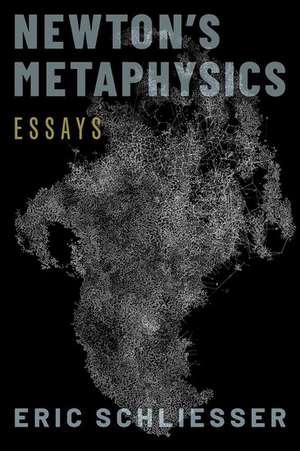Newton's Metaphysics: Essays
Autor Eric Schliesseren Limba Engleză Hardback – 12 oct 2021
Preț: 518.39 lei
Preț vechi: 639.19 lei
-19% Nou
Puncte Express: 778
Preț estimativ în valută:
99.20€ • 103.83$ • 82.56£
99.20€ • 103.83$ • 82.56£
Carte disponibilă
Livrare economică 26 februarie-04 martie
Preluare comenzi: 021 569.72.76
Specificații
ISBN-13: 9780197567692
ISBN-10: 019756769X
Pagini: 328
Dimensiuni: 240 x 166 x 28 mm
Greutate: 0.62 kg
Editura: Oxford University Press
Colecția OUP USA
Locul publicării:New York, United States
ISBN-10: 019756769X
Pagini: 328
Dimensiuni: 240 x 166 x 28 mm
Greutate: 0.62 kg
Editura: Oxford University Press
Colecția OUP USA
Locul publicării:New York, United States
Recenzii
In this wonderful collection of essays, Eric Schliesser embarks on an ambitious and long-awaited intellectual project: charting the complex and subtle nuances of the metaphysical view underpinning Newton's physics. In his characteristically visionary style, Schliesser invites us to explore the modal metaphysics at work behind Newton's notion of gravity, motion and laws of nature. The result is a fascinating and unrivalled journey through a less well-known Newton, one who did not shy away from engaging with metaphysical debates about necessity, chance and fatalism, and whose far-reaching contributions extend well beyond the realm of natural philosophy. This book is a gem for anyone interested in historical debates at the conjunction between physics and metaphysics.
This book provides rich new insights into Newton's metaphysics and philosophical theology. By placing Newton's thought in the context of early modern philosophy-and, in particular, the controversy over Spinozistic 'atheism'-Schliesser succeeds in illuminating a variety of puzzling issues not only about Newton but about a number of Newton's contemporaries, including Toland, Clarke, and Bentley. This book is highly recommended not only to Newton scholars, but to anyone with an interest in early modern philosophy.
Schliesser's essays are at the cutting edge of current research on Newton's philosophy. Important interpretive issues in Newton's treatment of space, causation, gravity, scientific method, and the role of God in the natural world are here addressed by one of the world's leading experts. The contributions to our understanding of Newton's treatment of time and of the relationship of his system of thought to Spinoza's are especially noteworthy. The breadth of the topics will encourage many readers interested in philosophy and science who have not yet studied Newton to discover reasons that they should.
The book stands out on another count that matters. A magnanimous spirit pervades it -of intellectual generosity toward Schliesser's peers, especially the young ones, whose voices sometimes go unheard- coupled with a good deal of humility. In that respect, Schliesser teaches a lesson we could all stand to learn.
This book provides rich new insights into Newton's metaphysics and philosophical theology. By placing Newton's thought in the context of early modern philosophy-and, in particular, the controversy over Spinozistic 'atheism'-Schliesser succeeds in illuminating a variety of puzzling issues not only about Newton but about a number of Newton's contemporaries, including Toland, Clarke, and Bentley. This book is highly recommended not only to Newton scholars, but to anyone with an interest in early modern philosophy.
Schliesser's essays are at the cutting edge of current research on Newton's philosophy. Important interpretive issues in Newton's treatment of space, causation, gravity, scientific method, and the role of God in the natural world are here addressed by one of the world's leading experts. The contributions to our understanding of Newton's treatment of time and of the relationship of his system of thought to Spinoza's are especially noteworthy. The breadth of the topics will encourage many readers interested in philosophy and science who have not yet studied Newton to discover reasons that they should.
The book stands out on another count that matters. A magnanimous spirit pervades it -of intellectual generosity toward Schliesser's peers, especially the young ones, whose voices sometimes go unheard- coupled with a good deal of humility. In that respect, Schliesser teaches a lesson we could all stand to learn.
Notă biografică
Eric Schliesser is Professor of Political Science, with a focus on Political Theory, at the University of Amsterdam. In addition, he is Visiting Scholar at the Smith Institute for Political Economy and Philosophy, Chapman University. His research encompasses a variety of themes, ranging from the history of the natural sciences and forgotten 18th-century feminists to political theory, the history of political theory, and the assumptions used in mathematical economics. His interest in the influence of the Chicago school of economics has increasingly moved his research toward the study of the methodology and political role of economists as experts. His publications include his monograph, Adam Smith: Systematic philosopher and Public Thinker (2017), and with Sandrine Bergès, the translated and edited collection, Sophie de Grouchy's Letters on Sympathy: A Critical Engagement with Adam Smith's The Theory of Moral Sentiments (2019). He has edited numerous volumes including (inter alia)Newton and empiricism, with Zvi Biener, 2014; Sympathy, a History of a Concept (2015); and Ten Neglected Classics of philosophy (2017). Together with Chris Smeenk he is editing the Oxford Handbook of Newton. He keeps a daily blog Digressionsnimpressions.
